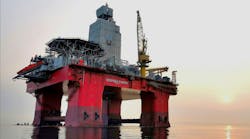By OGJ editors
HOUSTON, Nov. 4 -- Brazil's National Petroleum Agency (ANP) plans to offer a variety of areas in its sixth annual exploration and production round—scheduled for June 2004—in order to attract more bidders.
The change in strategy stems from the lack of interest shown in its fifth E&P round in August in which it offered 908 blocks but only awarded 101, with state-owned Petroleo Brasileiro SA (Petrobras) securing all but 13 of those. Only six companies bid in E&P Round 5.
Mines and Energy Minister Dilma Rousseff said last month that in the next round ANP would offer three types of areas: those in highly productive areas, where significant discoveries have already been made and which should attract the larger local and international investors; blocks in more-mature fields, which will play to medium and smaller companies; and unexplored, frontier areas where no significant discoveries have been made but which the government wants to see developed.
Newly available blocks
Among the more desirable areas to be offered are a number of potentially oil-rich blocks that Petrobras must relinquish according to an agreement it made in 1999 when Brazil first opened E&P activities for competition. At that time, certain potentially productive areas were reserved for Petrobras, which was given 5 years to either develop or relinquish them.
Rousseff said those blocks are an emerging focus of interest to many larger companies, and he expects the sixth licensing round to be a much more exciting event.
However, another factor that may play a significant part in a more-successful round would be a restructuring of Brazil's tax code, particularly as applied to deepwater discoveries. It is significant that Petrobras was the only company that bid on deepwater blocks in the August round.
The current 10% royalty applies whether the oil is in shallow or deep water and whether the oil is heavy or light, said Sebastião de Rego Barros, ANP's executive director. And the progressive series of taxes under the "Special Participation" program could result in taxes as high as 40% of net revenues in a highly productive field, he added (OGJ Online, Aug. 25, 2003).
After E&P Round 5, Maria das Gracas Silva Foster, mines and energy ministry executive secretary for oil and gas said, "We are evaluating the possibility of reviewing royalties and the fiscal burden for heavy oil discoveries in deep waters."
